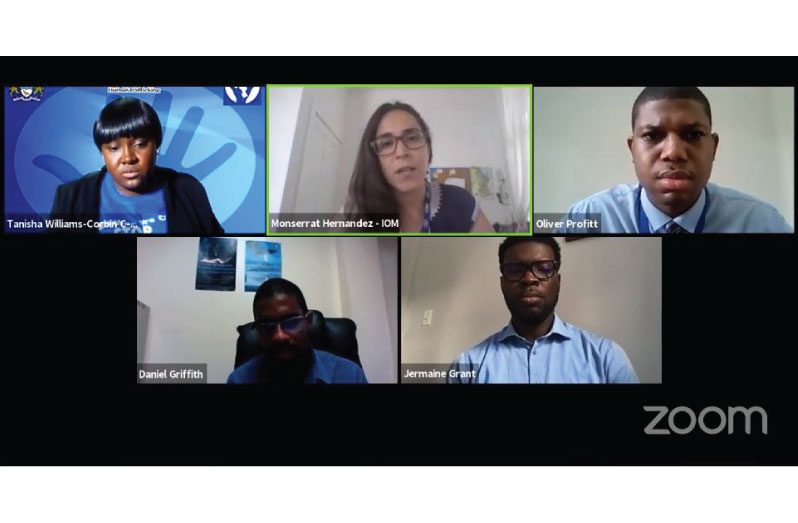SINCE 2018, Guyana has seen a drastic increase in the number of immigrants and non-nationals who are victims of trafficking in persons, and the situation has been exacerbated by the COVID-19 pandemic which hit Guyana since March.
This was at the heart of a virtual panel discussion held by the Ministry of Social Protection (MoSP) last Wednesday, as that agency continues is its week- long observance leading up to the World Day Against Trafficking in Persons (TIP), which will be celebrated on Friday, July 31. This year in celebration of the day, the Counter-Trafficking in Persons (C-TIP) Unit, at the MoSP is placing emphasis on migrant TIP victims, observing the event under the theme, “Embracing Diversity, Reducing Vulnerabilities, Promoting Safe Migration”, given the growing situation of TIP among migrants.
In 2019, from 25 reports some 140 TIP victims were rescued, of which over 90 per cent were Venezuelans ; the number also included Haitians and Cubans, while a few were Guyanese. These latest figures are in stark contrast to figures from the 2014 – 2017 period, when foreign nationals accounted for only 45 per cent of the TIP cases. “That’s an astronomical increase,” expressed Daniel Griffith, Acting Coordinator of Ministerial Task Force on TIP.
Griffith said it was around 2018 that cases started to drastically increase, being directly proportional to the influx of foreign nationals that started to come to Guyana, particularly Venezuelans who have been fleeing their Spanish- speaking nation due to its ongoing economic crisis.
In 2018, they were 32 reported cases that yielded some 245 alleged victims, of which 162 were Venezuelans; 49 were Cubans; 10 were from The Dominican Republic; and just 21 were Guyanese. For this year, statistics for January to June shows that following 19 reports, the C-TIP has rescued some 43 TIP victims, while eight males and 35 females, all were foreign nationals. Of those cases , 90 per cent were females below the age of 27 years .
“There’s a growing trend moving from predominantly Guyanese to foreign nationals, particularly Venezuelan nationals,” Griffith shared. He added that: “Human trafficking continues to be one of the most hidden crimes in Guyana. Due to complexities in detection, despite stringent efforts it’s occurring and continues to go on.”
Griffith was among those who presented at last Wednesday’s discussion. The panel discussions centred on the topic of “COVID and Its Impact on TIP and the Migrant Population.” Other presenters on the panel included International Organization for Migration (IOM)representatives Montserrat Hernandez, and Oliver Profitt , as well as Technical Officer from the Department of Citizenship, Jermaine Grant. The discussion was hosted by the C-TIP Unit Coordinator, Tanisha Williams – Corbin. Hernandez, Project Coordinator for the IOM (Guyana), said that the situation for the nationals have been exacerbated with the COVID-19 situation. “Migrants had already some challenges and barriers to access services, lack of job opportunity and livelihood, we have seen the situation aggravated in the last couple months. Leaving them to resort to activities that put them at risk of human trafficking and gender-based violence,” she noted.
Hernandez further noted that illegal crossing of migrants puts them at even further risk of being exposed to TIP. Hernandez said getting the migrants themselves to refrain from illegal crossings is easier said than done, so to mitigate the situation, the IOM tries to focus on educating migrants about their risks.
“We cannot control that person if they want to cross, but that puts them at greater risk of being smuggled and trafficked. For persons in desperate need of health and food, telling them not to cross is not enough, so it’s better to give them the information, so we just share with them the risks of crossing at illegal points of entry. For us the message is always we try to give them the information,” Hernandez explained.
She noted that the fact that nationals from many of these countries do not speak English has become another barrier that puts them at risk for trafficking, as well as leaving them in the dark about the COVID-19 situation and advisories. “It’s not just the risk of being smuggled, but also the risk of spreading the virus. That’s why it’s important that they know where the situation is and where they can approach if needed,” Hernandez said.
Hernandez noted that the IOM has been working along with the Ministry of Public Health, to help to translate documents into Spanish, Portuguese and Haitian Creole to help the situation. The IOM has also been assisting the most vulnerable of the migrants with shelter, food subsidies and supplies and hygienic and sanitising items. Profitt, the IOM National Coordinator in Guyana, also noted that the IOM Project provides the victims with psychosocial assistance such as small-business grants. Grant said at the Department of Citizenship several policy changes have been made to facilitate easier entry into Guyana for Venezuelan migrants, as a hopeful deterrent to illegal crossings. Grant explained that once the Venezuelans enter the country legally, it is easier for them to access services such as health and benefit from humanitarian programmes put in place to help migrants. A multi-agency coordinating committee comprising numerous governmental and non-governmental organisations, which meets regularly, was also set up to address the issue.




.jpg)









